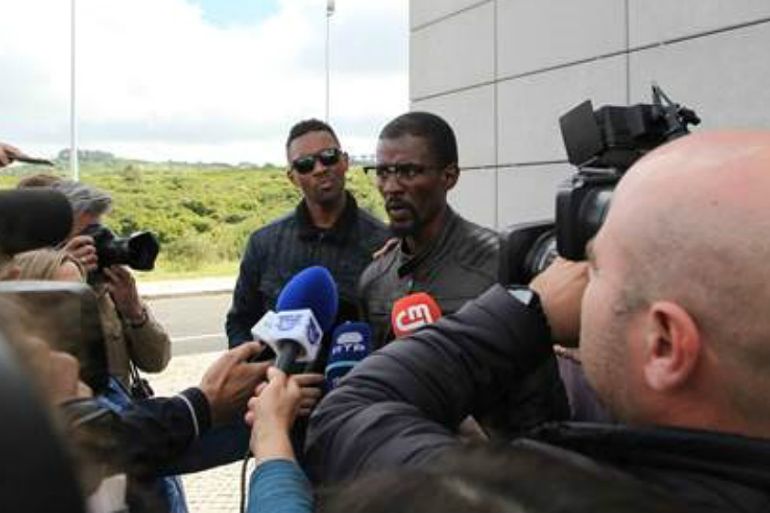Portugal police officers sentenced in unprecedented trial
One officer jailed, and others handed suspended sentences, after convictions for kidnapping and violence.

Lisbon, Portugal – Eight police officers were on Monday convicted of crimes ranging from aggravated kidnapping to grievous bodily harm against eight young black people in Lisbon.
It was the end – for now at least – of an unprecedented court case that saw seventeen agents on trial, bringing the issue of institutional racism and police violence in Portugal into the public eye. The sentences handed down, however, were met with disappointment and both sides intend to appeal.
Keep reading
list of 4 itemsBiden labels Japan and India ‘xenophobic’ along with China and Russia
After deadly attack, Russia’s Central Asian workers report rising racism
‘Feel less and less like playing’: Vinicius Jr in tears over racist abuse
The case was brought against PSP (Public Security Police) officers by the Public Prosecution Service (Public Ministry) and concerned the events of February 5, 2015, when police carried out an operation in Cova da Moura, a Lisbon neighbourhood known for its proud, predominantly Cape Verdean community. Two women, Neuza Correia and Jailsa Sousa – both bystanders – were left wounded after being shot with rubber-coated ammunition.
A series of police detentions during the operation were on Monday found to have been illegal, tantamount to aggravated kidnapping, and resulting in the grievous bodily harm to a further six people – Bruno Lopes, Rui Moniz, Celso Lopes, Flavio Almada, Paulo Veiga and Miguel Reis.
During the trial, it also emerged that police officers had falsified documentation and testimony in an attempt to justify the detentions, alleging that the victims had been trying to “storm” the police station. While illegally detained, victims incurred various injuries, including missing teeth. One was denied medication for a heart condition, the court heard.
Racial slurs and insults
In April, the Public Ministry dropped the accusation of “racial hatred”, as well as an accusation of torture, in what was seen as a blow to the victims’ case, which contained reports of repeated racial slurs and insults. All the police officers in the case are white and all the defendants are black, however, racism is not a prosecutable criminal offence in Portugal.
“The kind of discrimination they face every day because they’re poor and from working-class communities, because they’re black, because they work on the informal market, and so on – all of the prejudice they face in the streets, they also experienced, unfortunately, within the courtroom,” Lucia Gomes, the victims’ lawyer, told Al Jazeera.
Monday’s court session – the 34th since the trial got under way – was tense from the start, with at least 30 of the tiny courtroom’s seats occupied quickly by off-duty police officers and police union reps, leaving only three seats for the victims. The victims’ family and supporters – including the NGO SOS Racism – were forced to wait in the corridors outside. When Judge Ester Pacheco entered the courtroom to read her final decision, there were only four black faces in the courtroom, including two of the victims – Flavio Almada and Celso Lopes – and their lawyer, Jose Semedo Fernandes.
Judge Pacheco ruled that only one police officer would serve a prison sentence – of one year and six months – because he was already under a suspended sentence. The remaining seven convicted officers were given suspended prison sentences of between two months and five years, with the police station chief Luís Anunciacao receiving the longest sentence. The judge rejected the police officers’ version of events almost in its entirety, referring in detail to the Police Code and to the Portuguese constitution to make her points about professionalism and human rights.
However, it was the awarding of substantial compensation to the victims – which some officers will have to pay – that caused the most upset in the courtroom. Six of the victims were awarded payouts of around 10,000 euros ($11,160). Anunciacao received the largest bill, having been ordered to pay 50,000 euros ($55,780) to the victims.
‘Small victory’
There were emotional scenes outside the courtroom as some victims and supporters cautiously celebrated a small but significant victory. Lawyer Lucia Gomes was clearly relieved yet reserved in her reaction: “I can’t say that I’m happy,” she told Al Jazeera. “The court had every possibility to go much further than it did.”
On social media, prominent members of Portuguese anti-racism movements denounced the sentences as “shameful” and “pitiful”.
“The fact that organised black movements have emerged onto the public sphere in recent years may explain the small victory of today,” Pedro Schacht Pereira, an associate professor of Portuguese at Ohio State University, told Al Jazeera. “It is a ruling that gives an air of decency to the justice system, while preserving intact the idea that racism is not a Portuguese problem, since those charges were dropped.”
“It’s bittersweet,” said SOS Racism director Mamadou Ba after the session, calling the sentences “disproportionate” to the crimes committed. “Furthermore, the U-turn that the Public Ministry performed [on the charges of racism and torture] pose a serious challenge in the fight against institutional racism.”
The seventeen police officers were greeted with applause as they left the court building in Sintra – but many of them looked shaken. At least two have already made denouncements of slander against some of the victims. Peixoto Rodrigues, a police union leader, said they intended to appeal: “First, we’re going to analyse the decision that’s been made.”
The sentencing comes a year since the trial began – and more than four years after the events it dealt with. “I think they got off lightly,” Flavio Almada told reporters outside the court. “Our families, our friends, and our community have suffered greatly.”